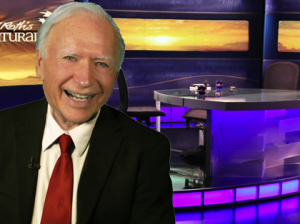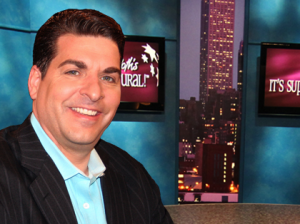Sid: I want everywhere to know the Messiah and my guest is going to help you be discipled. Because he has a translation of the New Testament with what I consider the freshest most alive translation I have read in a long, long time. It’s almost like reading the New Testament for the first time. He calls it “The Power New Testament.” He’s put put together a couple of things in this translation because he’s not only a Hebrew scholar but he is a Greek scholar. But he’s put together in this special translation his understanding of Jewish roots. But his understanding of the action words that were in the Hebrew language in the Jewish people where the first church were all Jewish believers and they were using these action words and they were using these action tenses. And when you read this the reason that he calls it “The Power New Testament” is because that power is recaptured. I tell you the Holy Spirit will just come alive within you and understanding healing. But somehow these Jewish roots and his Greek scholarship and his Hebrew scholarship it’s like a fresh reading of the New Testament. Now there is a scripture and I’m speaking to the translator William Morford at his home in Lexington, South Carolina. There’s a passage in the New Testament that I wrestle with and I image that everyone listening to us has wrestled with this and I’d like to get your understanding from a Jewish roots perspective and a power perspective. And it’s got to do with Matthew 5:17.Would you read that in your translation?
Bill: “Do not think that I came to annul, to bring and incorrect in interpretation to the Torah or the Prophets; I did not come to annul but to bring spiritual abundance. For the Torah to be obeyed as it should be and for God’s promises to receive fulfillment. For truly I say to you; until the sky and the earth would pass away not one yod or one vav would ever pass away from the Torah, until everything would come to pass.”
Sid: And Bill the way you translated it it’s not a matter of salvation, it’s not a salvation issue, but it’s a matter of spiritual abundance. A matter of blessings and as a matter of fact there is another word you translate instead of saying law you say Torah. And when I see the word law I think of legalism, bondage. But I have to tell you coming from a Jewish background which I do when I see the word Torah, which is the first 5 books of the Old Testament, I think of legalistic and bondage. But when you explain what the word Torah really means it takes on a whole new meaning. In your footnotes what does Torah mean?
Bill: Torah actually means teaching or instruction. And we have to view those commandments in there as the Lord teaching us. He knows us because He made us and He made us in His image. He understands us totally.
Sid: You know the word instructions I’m almost thinking rather than Torah, rather than law, I’d much rather have the word instructions there.
Bill: (Laughing)
Sid: There because to me that gives it much more meaning. In fact I’m toying… you and I are talking about putting together an Old and New Covenant, this is just a New Covenant. And when we did… and I haven’t said this to you but I’d almost like to call it “The Book of Instructions.” How does that sound to you?
Bill: Oh, that sounds good it really does.
Sid: Well, I’d like you teach a little bit of some of these insights that you got from Eliezer Ben-Yehuda and from other studies that you just packed into “The Power New Testament.”
Bill: Yeah, Eli was really spectacular just unbelievable. To go to a Jewish Rabbi, which I went to him because he was the only Rabbi in town.
Sid: Yeah, but you didn’t even realize what a heritage this guy had; if it wasn’t for him we wouldn’t be speaking Hebrew today in Israel.
Bill: That’s right.
Sid: I mean if it wasn’t for his grandfather that is.
Bill: He is as brilliant as his grandfather. He speaks 8 languages and he is a true man of letters and just a wonderful warm person. He was very very helpful. And showed me his grandfather’s dictionary. Which was really amazing. Well, we won’t get into that but…
Sid: But so the Mishpochah understand this his grandfather is the one that pioneered modern day Hebrew to be spoken language in Israel. And he had a dictionary and he literally came up with a lot of these Hebrew words, isn’t that true?
Bill: Yes and he went to root words to find modern words to fit like “Ice Cream.” He went to frozen milk and called it “glee-dah” in Hebrew.
Sid: Huh.
Bill: But you know his dictionary now gives the meaning of each Hebrew word in Hebrew and gives an example from the Hebrew scriptures of how that word is used in scripture. And then he gives the meeting in German and French and English and in Arabic.
Sid: Now I happen to be looking at my notes here in Luke and this is my favorite reading Bible and Luke 2:44 when there was a problem and Jesus was at the temple and they thought he was lost. You explain something that no one would understand. Explain that from Luke 2:44.
Bill: Right when the people went to Jerusalem for a feast or any special occasion they go in a large group for safety. And leaving Nazareth to go to Jerusalem the men would walk at each end of the column and the woman and children would walk in the middle. But on the way home Jesus had been through the 1st century equivalent of what we now call the Bar Mitzvah And he would have gone home as a an adult. So they got a whole day away before Mary and Joseph realized that Jesus wasn’t with them. Because Mary knew that he wouldn’t be with her and Joseph would just assumed he was with other relatives at the other end of the column. Then they had to go back to Jerusalem and spend 3 days looking for him.
Sid: You know another interesting thing you bring out, how many times is the word church found in the New Testament?
Bill: Zero.
Sid: And yet all of these translations say church. What does the Greek word really say?
Bill: Congregation.
Sid: And what a difference because when I hear the word church I think building; but when I hear congregation I think people.
Bill: Right.
Sid: It makes a world of difference.
Bill: It does and it’s all about people and that’s still what God cares about today it’s our people. I think that’s one of reasons that home churches are doing so well. Like Yonggi Cho started, my goodness the people in his church can’t possibly get into the building because they number in the 100’s of thousands, but they really do well and grow spirituality in home meetings. And it’s the congregation that’s being re-abled to relate to a pastor who knows you, who cares and who lays hands on you in a regular basis. Just as Jesus laid hands on people all over Israel.
Sid: Tell me about some of these idioms or Hebrewisms. For instance in Matthew 16:19 we talk about binding and loosening. What does that really mean?
Bill: Well, to bind is to forbid in Hebrew and to loose means to permit. And what’s really significant about that goes on “I will give you the keys of the Kingdom of heaven and whatever you would bind upon the earth would already have been bound in the heavens with ongoing affect.” See that particular tense in Hebrew, I mean in the Greek, means that. And whatever you would loose upon the earth will already have been loosed in the heavens with ongoing affect. So it means that we don’t bind anything that we don’t like because we don’t like it. But what we bind to be affective in that binding it must be something that has already been bound in heaven. In other words, we have to go by God’s word and not by just things that bother us.
Sid: Okay, so for example you explain that many times in Bibles they translate sickness and they really should translate it evil. So we know that from the word of God that God wants us to forbid evil.
Bill: Absolutely.
Sid: And do you see this Mishpochah by understanding this I can see clearly why you call this “The Power New Testament.” Give me one other quick example.
Bill: Matthew 7:21 is a good one. While we’re in that book 7:21 “Not everyone who says to me Lord Lord will enter the Kingdom of the heavens but the one that does the will of My Father; the one in the heavens. Many will say to Me on that day Lord, Lord, did we not prophesy in Your Name? And we cast out demons in Your Name and did many miracles in Your name. And then I will declare to them that “I never knew you.” You working without Torah must continually depart from me.” So Jesus is saying you have to go by the teachings, by the scripture. And what is the second most commandment we have the second most important is “Love your neighbor as yourself.” That’s why in Matthew 25 He talks about whatever you did for the least of these you have done for me.” Those are the significant… that’s where our focus needs to be and doing His will is in taking care of other people.
Sid: Oops we’re out of time.




